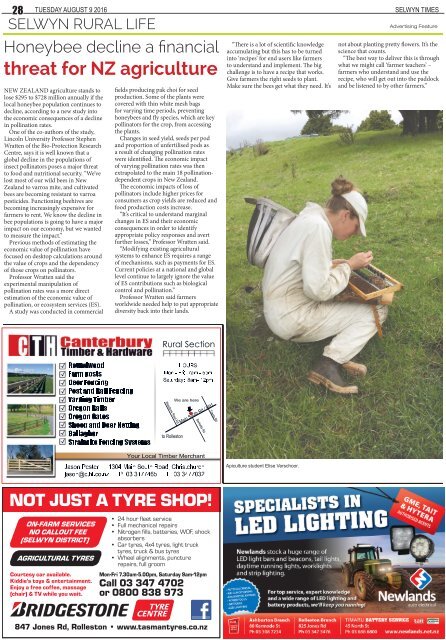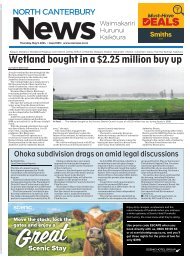Create successful ePaper yourself
Turn your PDF publications into a flip-book with our unique Google optimized e-Paper software.
28<br />
2<br />
[Edition datE]<br />
Tuesday <strong>August</strong> 9 <strong>2016</strong><br />
SELWYN RURAL LIFE<br />
Honeybee decline a financial<br />
threat for NZ agriculture<br />
New ZealaNd agriculture stands to<br />
lose $295 to $728 million annually if the<br />
local honeybee population continues to<br />
decline, according to a new study into<br />
the economic consequences of a decline<br />
in pollination rates.<br />
One of the co-authors of the study,<br />
lincoln University Professor Stephen<br />
wratten of the Bio-Protection Research<br />
Centre, says it is well known that a<br />
global decline in the populations of<br />
insect pollinators poses a major threat<br />
to food and nutritional security. “we’ve<br />
lost most of our wild bees in New<br />
Zealand to varroa mite, and cultivated<br />
bees are becoming resistant to varroa<br />
pesticides. Functioning beehives are<br />
becoming increasingly expensive for<br />
farmers to rent. we know the decline in<br />
bee populations is going to have a major<br />
impact on our economy, but we wanted<br />
to measure the impact.”<br />
Previous methods of estimating the<br />
economic value of pollination have<br />
focused on desktop calculations around<br />
the value of crops and the dependency<br />
of those crops on pollinators.<br />
Professor wratten said the<br />
experimental manipulation of<br />
pollination rates was a more direct<br />
estimation of the economic value of<br />
pollination, or ecosystem services (eS).<br />
a study was conducted in commercial<br />
fields producing pak choi for seed<br />
production. Some of the plants were<br />
covered with thin white mesh bags<br />
for varying time periods, preventing<br />
honeybees and fly species, which are key<br />
pollinators for the crop, from accessing<br />
the plants.<br />
Changes in seed yield, seeds per pod<br />
and proportion of unfertilised pods as<br />
a result of changing pollination rates<br />
were identified. The economic impact<br />
of varying pollination rates was then<br />
extrapolated to the main 18 pollinationdependent<br />
crops in New Zealand.<br />
The economic impacts of loss of<br />
pollinators include higher prices for<br />
consumers as crop yields are reduced and<br />
food production costs increase.<br />
“It’s critical to understand marginal<br />
changes in eS and their economic<br />
consequences in order to identify<br />
appropriate policy responses and avert<br />
further losses,” Professor wratten said.<br />
“Modifying existing agricultural<br />
systems to enhance eS requires a range<br />
of mechanisms, such as payments for eS.<br />
Current policies at a national and global<br />
level continue to largely ignore the value<br />
of eS contributions such as biological<br />
control and pollination.”<br />
Professor wratten said farmers<br />
worldwide needed help to put appropriate<br />
diversity back into their lands.<br />
“There is a lot of scientific knowledge<br />
accumulating but this has to be turned<br />
into ‘recipes’ for end users like farmers<br />
to understand and implement. The big<br />
challenge is to have a recipe that works.<br />
Give farmers the right seeds to plant.<br />
Make sure the bees get what they need. It’s<br />
SELWYN TIMES<br />
not about planting pretty flowers. It’s the<br />
science that counts.<br />
“The best way to deliver this is through<br />
what we might call ‘farmer teachers’ –<br />
farmers who understand and use the<br />
recipe, who will get out into the paddock<br />
and be listened to by other farmers.”<br />
Rural Section<br />
Roundwood<br />
Farm posts<br />
Deer Fencing<br />
Post and Rail Fencing<br />
Yarding Timber<br />
Oregon Rails<br />
Oregon Gates<br />
Sheep and Deer Netting<br />
Gallagher<br />
Strainrite Fencing Systems<br />
HOURS<br />
Mon - Fri: 7am - 5pm<br />
Saturday: 8am- 12pm<br />
Weedons Ross Rd<br />
to Rolleston<br />
We are here<br />
Berketts Rd<br />
Trents Rd<br />
Main South Rd / SH1<br />
Your Local Timber Merchant<br />
Jason Pester 1304 Main South Road, Christchurch<br />
jason@cthl.co.nz P 03 3477465 F 03 3477032<br />
Apiculture student Elise Verschoor.<br />
Not just a tyre shop!<br />
On-FaRM SERViCES<br />
No CaLLout Fee<br />
(SElwyn diSTRiCT)<br />
aGRiCUlTURal TyRES<br />
Courtesy car available.<br />
Kiddie’s toys & entertainment.<br />
Enjoy a free coffee, massage<br />
(chair) & TV while you wait.<br />
• 24 hour fleet service<br />
• Full mechanical repairs<br />
• Nitrogen fills, batteries, WOF, shock<br />
absorbers<br />
• Car tyres, 4x4 tyres, light truck<br />
tyres, truck & bus tyres<br />
• Wheel alignments, puncture<br />
repairs, full groom<br />
Mon-Fri 7.30am-5.00pm, Saturday 9am-12pm<br />
Call 03 347 4702<br />
or 0800 838 973<br />
847 Jones Rd, Rolleston • www.tasmantyres.co.nz


















